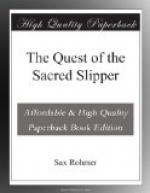The Congo Fibre company
Evidently the Congo Fibre Company had so recently taken possession of the offices that there had been no time to inscribe their title either upon the doors or upon the board in the hall.
Inspector Bristol was much impressed, for into one of the rooms occupied by the Fibre Company shone that curious disc of light which first had drawn his attention to Bank Chambers. He rapped on the door, turned the handle, and entered. The sole furniture of the office in which he found himself apparently consisted of one desk and an office stool, which stool was occupied by an office boy. The windows opened on the court, and a door marked “Private” evidently communicated with an inner office whose windows likewise must open on the court. It was the ceiling of this inner office, unless the detective’s calculation erred, which he was anxious to inspect.
“Yes, sir?” said the boy tentatively.
Bristol produced a card which bore the uncompromising legend: John Henry Smith.
“Take my card to Mr. Boulter, boy,” he said tersely. The boy stared.
“Mr. Boulter, sir? There isn’t any one of that name here.”
“Oh!” said Bristol, looking around him in apparent surprise: “how long is he gone?”
“I don’t know, sir. I’ve only been here three weeks, and Mr. Knowlson only took the offices a month ago.”
“Oh,” commented Bristol, “then take my card to Mr. Knowlson; he will probably be able to give me Mr. Boulter’s present address.”
The boy hesitated. The detective had that authoritative manner which awes the youthful mind.
“He’s out, sir,” he said, but without conviction.
“Is he?” rapped Bristol. “Well, I’ll leave my card.”
He turned and quitted the office, carefully closing the door behind him. Three seconds later he reopened it, and peering in, was in time to see the boy knock upon the private door. A little wicket, or movable panel, was let down, the card of John Henry Smith was passed through to someone unseen, and the wicket was reclosed!
The boy turned and met the wrathful eye of the detective. Bristol reentered, closing the door behind him.
“See here, young fellow,” said he, “I don’t stand for those tricks! Why didn’t you tell me Mr. Knowlson was in?”
“I’m very sorry, sir!”—the boy quailed beneath his glance—“but he won’t see any one who hasn’t an appointment.”
“Is there someone with him, then?”
“No.”
“Well, what’s he doing?”
“I don’t know, sir; I’ve never been in to see!”
“What! never been in that room?”
“Never!” declared the boy solemnly. “And I don’t mind telling you,” he added, recovering something of his natural confidence, “that I am leaving on the 31st. This job ain’t any use to me!”
“Too much work?” suggested Bristol.




